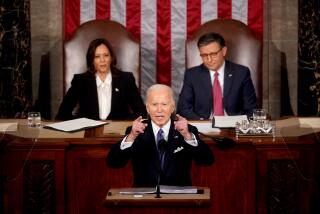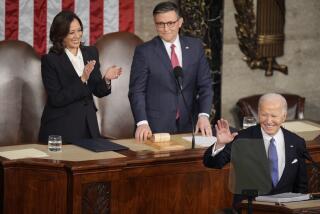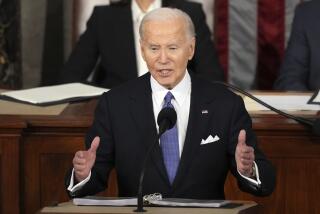Clinton Seizes Moment, Puts GOP on Defensive : Politics: His ideas are strongly supported in poll. Dole, Gingrich vow to work with President on health reform.
WASHINGTON — If one purpose of President Clinton’s State of the Union Address was to seize the political initiative despite Republican control of Congress, the President could claim a measure of success Wednesday: For the first time in months, GOP leaders were responding to his proposals instead of the other way around.
The first wave of public opinion polls showed a generally positive public response to Clinton’s call for a leaner but still activist government. A CNN/USA Today poll found that the speech increased approval of Clinton’s positions to 83% among those who watched the address, although analysts said that the boost is likely to be temporary.
The White House clearly hopes that Clinton turned a corner by injecting himself and his legislative objectives, diminished as they are, back into a public policy arena that Republicans have dominated since the November elections. The early signs appear to favor Clinton, at least to the extent that GOP leaders were discussing his ideas--and grudgingly admitting that Clinton had positioned himself well.
“The President gives a good speech. . . . I think he’d get about a B, maybe a little better,” allowed Senate Majority Leader Bob Dole (R-Kan.). “But the proof is always in the follow-through: What happens next? Is the President going to deliver? Is he going to work with the Republican Congress?”
Democratic analysts agreed, warning Clinton that he must now turn his promises into reality. “People want something tangible, not just words,” said David Axelrod, a political consultant in Chicago. “Clinton needs to be seen delivering results for the middle class--or at least to be seen as fighting for the middle class against Republican opposition, which is almost as good.”
On several issues Clinton raised--including health care and a minimum wage increase--at least some Republicans said they are willing to cooperate with the White House:
* On health care, House Speaker Newt Gingrich (R-Ga.) said that he can deliver modest medical insurance reforms of the kind Clinton endorsed within a matter of months. “We can, step-by-step, send a series of reforms to the President, frankly, maybe by summer,” Gingrich told reporters. But, he said, Democrats must cooperate by keeping more controversial, broad-scale reform proposals off the table.
“We are going to work on a health care bill,” Dole said in a television interview. “We’ll do the things the President suggested.”
In his speech, Clinton acknowledged that he made a mistake in seeking too sweeping a reform in his health care proposal last year and asked for new laws to permit workers to take their health insurance from one job to another, outlaw the insurance industry practice of denying coverage to people who are already ill and provide coverage to poor children.
* On the minimum wage, Dole said that he is willing to consider a compromise with Clinton. “I’ve supported minimum wage increases in the past--not all of them,” Dole said. “But I think we need to look very closely because we don’t want to cause a loss of jobs.”
White House Press Secretary Mike McCurry said that Clinton decided not to propose a specific increase in the minimum wage from the current $4.25 to $5 an hour, as his advisers suggested, because it would merely set off a partisan wrangle. “We didn’t want to send up something that would just go into a dustbin,” he said.
Nevertheless, at least some Democrats were still spoiling for a fight on the issue. “That’s one place where we can very clearly draw a distinction with the new majority that the American people can understand right away,” Clinton political adviser Paul Begala said. Gingrich and House Majority Leader Dick Armey (R-Tex.) “don’t want working people to get a 75-cent bump in their pay.”
* The GOP majority on a House committee approved a bill to grant the President a line-item veto, allowing him to block spending by Congress on individual items in appropriations bills.
The House Government Reform and Oversight Committee approved the bill, a key part of the Republicans’ “contract with America,” and sent it to the House floor. Clinton had asked for the measure in the past and repeated his endorsement in Tuesday’s speech.
Partisan combat did not dissipate entirely, however. Dole denounced Clinton for hypocrisy in calling for an end to gifts from lobbyists to lawmakers, pointing out that Clinton’s own legal defense fund accepted contributions from lobbyists. Within hours, Clinton instructed the trustee of his fund to stop accepting donations from registered lobbyists.
The fund was established last June to help President and Mrs. Clinton pay mounting legal bills from the Whitewater investigation and the Paula Corbin Jones sexual harassment lawsuit.
The fund never accepted contributions from corporations, unions, political action committees or law firms. But it had derived a substantial amount of its estimated $500,000 war chest from Democratic lobbyists and their friends in Washington.
Clinton had called on members of Congress to “just say no” to gifts, meals and travel from corporate lobbyists, even though no law prohibits them.
The President spent most of Wednesday journeying to Kutztown, a middle-class small town in Pennsylvania, to keep his message in the media for one more day.
Speaking at Kutztown University, Clinton asked voters to support his proposal for a tax deduction for college tuition and other post-secondary education costs.
He told an audience of several thousand that they should encourage the government to continue reducing the deficit and paring the federal bureaucracy, telling budget cutters: “Keep on doing what you’re doing--but increase investment in education.”
As the President spoke, 30 Cabinet secretaries and sub-Cabinet officials fanned out across the country to try to reinforce his plea for the program he has called the “middle-class bill of rights,” a list of tax credits and deductions for education, job training, families with children and individual retirement accounts.
White House officials have often lamented that even Clinton’s better speeches are too quickly forgotten by his audiences.
As for the 81-minute duration of Tuesday’s speech, Clinton aides insisted that it was not the President’s fabled long-windedness, but the unexpectedly exuberant response of Congress that stretched the talk.
“He was working on the assumption that there would not be a lot of applause,” Press Secretary McCurry said, describing Clinton as “pleasantly surprised” by the 90 interruptions during his oration.
The length was not lost on Republicans. “I was going to call a recess,” Dole joked.
On Tuesday morning, the speech was expected to last about 30 to 45 minutes. But Clinton felt strongly that, among other things, he needed to expand sections at the beginning and the end that better explained the philosophical program he calls his “new covenant.”
Just minutes before the speech, Clinton was still in the White House residence dictating revisions to the text into a tape recorder. Working on the final changes were Mrs. Clinton, Vice President Al Gore, Chief of Staff Leon E. Panetta, and advisers Bruce Reed and George Stephanopoulos.
Even as he sat in his limousine for the short ride to the Capitol, Clinton could be seen scratching final changes on the draft.
One Democratic consultant said that the length of the speech might have been a plus. “Yes, it was too long,” said Ed Sarpaulis, a longtime Michigan political operative. “But there’s a core constituency out there of older Americans, (Ronald) Reagan Democrats, who won’t switch channels on a presidential speech. And he was able to get his message to them, by repeating his achievements.”
McManus reported from Washington and Richter from Kutztown, Pa. Times staff writers John M. Broder and Robert Shogan also contributed to this story.
More to Read
Get the L.A. Times Politics newsletter
Deeply reported insights into legislation, politics and policy from Sacramento, Washington and beyond. In your inbox three times per week.
You may occasionally receive promotional content from the Los Angeles Times.












